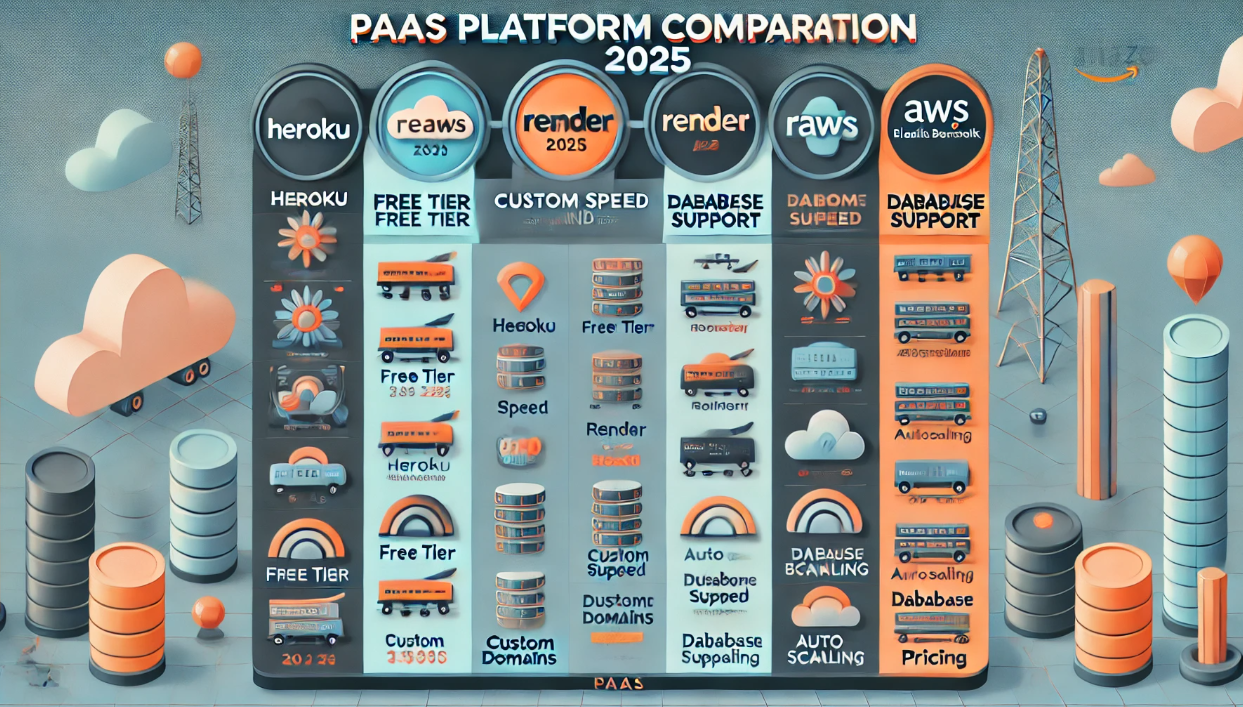The Best PaaS Platforms in 2025: Features, Pricing, and Use Cases
Meta Description: Looking for the best PaaS platform in 2025? Compare top solutions like Heroku, Render, Railway, and AWS Elastic Beanstalk based on features, pricing, developer experience, and ideal use cases.
☁️ Introduction: PaaS Is the Developer’s Playground
In 2025, Platform-as-a-Service (PaaS) continues to be the go-to option for developers, startups, and growing businesses that want to build and deploy apps quickly — without managing infrastructure.
With so many platforms out there, how do you choose the right one?
This post compares the top PaaS platforms of 2025, breaking down what makes each unique based on:
-
Features
-
Pricing
-
Developer experience
-
Ideal use cases
Let’s dive into the leading options — and help you find the one that fits your workflow best.
1. Render – The Versatile PaaS for Modern Apps
Overview:
Render has gained serious traction thanks to its simplicity, speed, and powerful features. It supports static sites, web services, cron jobs, and background workers out of the box.
⭐ Key Features:
-
Git auto-deploy (connects to GitHub/GitLab)
-
Native support for Node.js, Python, Go, Ruby, Docker
-
Built-in PostgreSQL, Redis, background workers
-
Free SSL, custom domains, global CDN
Pricing:
-
Free tier available
-
Web services: from $7/month
-
Background workers: from $5/month
-
Databases: from $7/month
Best For:
Startups, developers building full-stack apps, API-first tools
2. Heroku – The Classic PaaS Still Holding Strong
Overview:
Heroku remains a beloved choice for developers seeking a no-fuss deploy experience. It paved the way for modern PaaS and still excels at rapid prototyping and early-stage app deployment.
⭐ Key Features:
-
Git-based deploys (
git push heroku main) -
Buildpacks for multiple languages (Node.js, Ruby, PHP, Java)
-
Add-ons marketplace for databases, caching, logging, etc.
-
Simple environment variable management
Pricing:
-
Free tier replaced with Eco plan: $5/month
-
Hobby: $7/month
-
Professional Dynos: from $25/month
Best For:
Hackathons, MVPs, teaching, personal projects
3. Railway – The PaaS for Speed & Simplicity
Overview:
Railway.io focuses on developer experience and super-fast deployments. It abstracts a lot of configuration and automates setup for databases and environments.
⭐ Key Features:
-
Instant deploy from GitHub
-
One-click database provisioning
-
Minimal setup, slick UI
-
Secret management and custom domains
Pricing:
-
Free tier (500 hours/month)
-
Developer Plan: $5/month
-
Team & Pro Plans: scale with usage
Best For:
Solo developers, hackathon participants, rapid prototyping
4. AWS Elastic Beanstalk – PaaS for Power Users
Overview:
Part of the AWS ecosystem, Elastic Beanstalk gives you the power of AWS without deep DevOps knowledge. It’s highly configurable and integrates with dozens of AWS services.
⭐ Key Features:
-
Auto-scaling, load balancing, monitoring
-
Support for Java, Python, Go, .NET, Node.js, PHP
-
CI/CD integration with CodePipeline and Git
-
Control EC2, RDS, S3, and more under the hood
Pricing:
-
No extra charge for Beanstalk itself
-
You pay for EC2, RDS, and related AWS services
-
Pricing varies based on instance type and usage
Best For:
Enterprises, DevOps teams, AWS-native apps
⚡ 5. Fly.io – Global Deploys, Edge-Focused
Overview:
Fly.io runs your apps close to your users — literally. It deploys workloads across a global network of edge servers for ultra-low latency and high resilience.
⭐ Key Features:
-
Global app distribution
-
Built-in Postgres hosting
-
Docker-based deploys
-
Support for Elixir, Node, Go, Python, etc.
Pricing:
-
Generous free tier (~3 shared CPU hours + storage)
-
Apps: from $2.50/month
-
Databases: from $1/month for tiny clusters
Best For:
Global-first apps, microservices, real-time tools
Bonus Mentions:
-
Google App Engine – Good for scaling apps in Google Cloud environments
-
Azure App Service – For Microsoft-centric tech stacks
-
Qovery – Modern PaaS with Kubernetes under the hood
-
CapRover – Self-hosted PaaS for DIY teams
Which PaaS Platform Should You Choose?
| Use Case | Best Platform |
|---|---|
| MVP, hackathons | Heroku, Railway |
| Full-stack startup | Render |
| Enterprise apps | AWS Elastic Beanstalk |
| Real-time/edge services | Fly.io |
| Tight budgets | Railway, Fly.io, Render Free Tiers |
✅ Final Thoughts: PaaS in 2025 Is Smarter Than Ever
Choosing a PaaS used to mean sacrificing flexibility for simplicity — but in 2025, the landscape is rich, diverse, and developer-focused.
Whether you’re shipping side projects or scaling a global SaaS, there’s a platform tailored to your workflow.
Look for:
-
Tools that match your stack
-
Pricing that matches your scale
-
Speed that matches your ambition
Then push to prod — and let the platform handle the rest.

